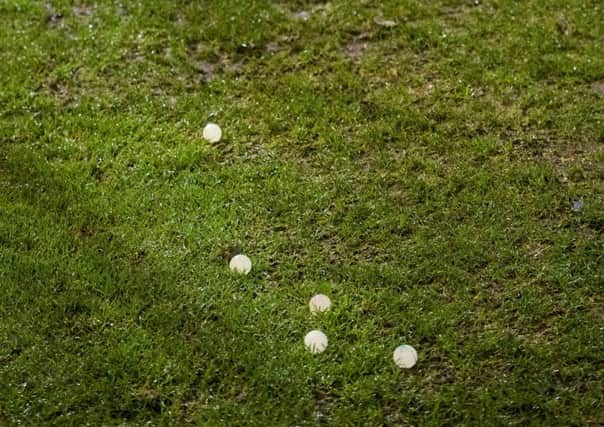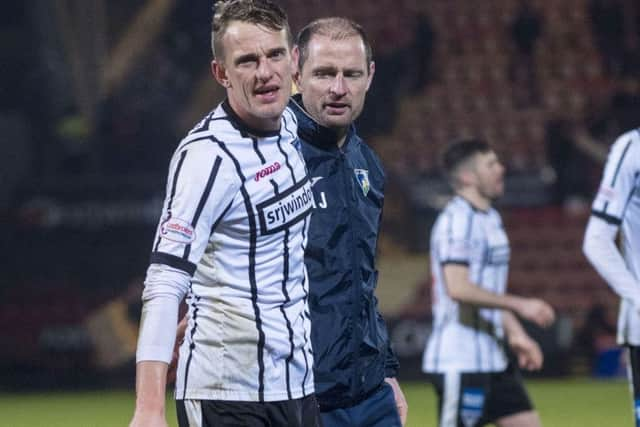How the Falkirk-Dunfermline rivalry reached a new low


Scotland’s currently most talked about derby fixture is considered to have reached a new low on Tuesday. Joke-shop eyeballs were flung from the away end at East End Park to goad Dunfermline’s Dean Shiels, whose damaged right eye was removed in 2006.
Whether you agree that this is a new extreme in tastelessness might depend on where you stand on songs celebrating the death of a deceased legendary player, something heard intermittently at games between the sides since Dunfermline skipper Norrie McCathie tragically passed away 21 years ago next week.
Advertisement
Hide AdAdvertisement
Hide AdBut that we are even having this discussion underlines just how relations between the two clubs have soured going back decades. They have already played each other four times this season, including an Irn Bru Challenge Cup clash. So 7 April, when their only other meeting this season is scheduled, can’t come slowly enough as we digest the events of the last few weeks.


Kevin O’Hara and Joe McKee are still serving bans imposed for abuse aimed towards Shiels in the cup match in November, when Shiels himself was sent off. Two Dunfermline players were then red-carded in the next league clash, which took place before the cases of O’Hara and McKee were heard by the SFA and with tensions still running high.
But then relations between the clubs, or at least their supporters, have been strained for at least a quarter of a century. The genesis of such hatred has been the subject of debate for almost as long.
Their jousting appeared at first to mirror the mostly good-natured rivalry shared by many clubs in close geographic proximity to each other and who were often fighting for the same prize – promotion to the top flight or avoiding relegation from it.
Falkirk and Dunfermline were meant to focus their respective ire elsewhere – the former had East Stirlingshire, an admittedly lowlier combatant, once sharing the same town, while the Pars could enjoy a real derby friction with Raith Rovers, their Fife neighbours. But it seems they cannot resist the desire to direct spite at each other.


“I think it really arose in the early 1990s,” says Paul Hutton, who once edited the Falkirk fanzine Rupert’s Roar. “At the time they [Dunfermline] had Jim Leishman, who was a master showman, and there seemed to be a lot of games in quick succession. You played three or four times in the league and then there was the B&Q Cup.”
“I first noticed it around the time Richard Cadette played for us,” he adds, with reference to the early 1990s. According to Hutton, Falkirk’s black forward had to endure racist abuse from some Dunfermline fans, though, Hutton adds, they were far from the only culprits.
As happens in football, prejudice tends to be handed down like a repulsive heirloom between generations of supporters, its provenance forgotten. It’s likely none of those perpetrators on Tuesday who Falkirk are promising to weed out from CCTV pictures supplied by Dunfermline were alive in the 1980s, when the sides shared some titanic battles, and when enmity began to grow. One game in March 1989, when Falkirk defeated Dunfermline 4-0 in the old First Division on a night their fans dubbed “Super Tuesday”, prompted the Falkirk Unofficial Fanzine to issue badges commemorating the achievement. But the rivalry seemed hinged mostly around football then and was good for business – crowds were healthy at both the old Brockville Park and East End Park.
Advertisement
Hide AdAdvertisement
Hide AdFormer Falkirk player and current PFA Scotland chief executive Fraser Wishart, pictured left, has condemned the “small minority” of Falkirk fans who stooped to such depths at Dunfermline on Tuesday. “We find it difficult to understand the mind set of these individuals and are sure that the vast majority of Falkirk supporters will be appalled at this behaviour and the good name of their club being tarnished,” he said.
Wishart went on to state that it was “beyond our comprehension that anyone would think such behaviour acceptable”, adding that “two of our members received lengthy bans for making discriminatory comments towards Dean last year so it seems only fair that those involved in this incident similarly face some form of punishment.”
Kenny Shiels, meanwhile, has claimed his son has been forced to put up with abuse linked to his disability – he lost the sight in his eye as a child after an accident, then had the eye removed when with Hibs 12 years ago – at games almost every week in Scotland, which provides another depressing insight.
It isn’t even just about Dunfermline and Falkirk, something underlined by the abuse, concerning the death of his son, directed at Jake Livermore when the West Bromwich Albion player was replaced during an English Premier League fixture at West Ham United, also on Tuesday.
Shiels, pictured right, has revealed the extent to which his son has to try to ignore the hurtful barbs. “It’s been going on a while,” the Derry City manager told BBC Northern Ireland, as news spread of this new horror visited upon his son as he simply sought to earn a living.
“He played in the Edinburgh derby and got it there, he got it at St Mirren – he gets it every week,” he said. “Falkirk played Inverness in a game three weeks ago, and Dean had no association with that match, and they were singing songs about him at that match as well. It’s hard for him. But he’s a strong boy. He’ll get through it OK.”